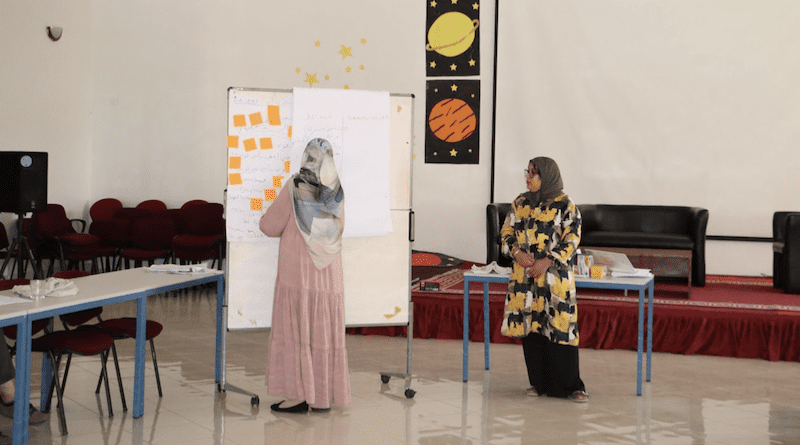IMAGINE For Men: The Role Of Male Empowerment In Women’s Empowerment – OpEd
On Friday, Jun 23, 2023 twelve women completed the High Atlas Foundation’s IMAGINE workshop led by the HAF’s women’s empowerment trainer Ibtissam Niri. Women were led in modules and activities that targeted seven main areas of life: body, money, spirituality, emotions, work, sexuality, and relationships. Their hopes, goals, frustrations, and desires for themselves were shared amongst each other in the collective group setting. “Motivation”, “Confidence”, “Soul-fulfilling”, and “Vision” were just a sample of words women used to describe the impact IMAGINE had on them.
This is just one of many IMAGINE workshops done every year. It’s based on David Gershon and Gail Straub’s book “Empowerment: The Art of Creating Your Life as You Want It” and adapted from the Empowerment Institute for African and Middle Eastern countries. The purpose of IMAGINE is to empower women and their voices by overcoming long-held beliefs and seeing a new vision for themselves. IMAGINE’s efforts in Morocco have been praised highly, and the results are transformative in women. Nineteen cooperatives have been fostered as a result of IMAGINE and hundreds of commitments to bettering their future.
These workshops and other efforts play an important role in Morocco as gender inequality is still at-large. Norms of women in Morocco include women being weak, intellectually and morally inferior to men. In a study conducted in Tiznit , women remarked that there was difficulty in being ambitious or against the status quo as a woman due to traditions and norms holding them back. There’s little expectation of a woman’s potential in society. Their limited authority “revolve(s) around ‘working through men’”. This in turn maintains and perpetuates the patriarchal norms that men hold power and dependency in society. The 2011 Constitution calls for men and women to be seen as equal. This change in law gives legal acknowledgment in effort to combat gender norms and inequality in Morocco coupled with efforts of IMAGINE and other empowerment workshops. Still, the root of the issue persists: the societal patriarchy and traditional masculinity, which falls largely on men’s action. It raises the question — how can men be included in the efforts to dismantle the status quo? If so, what?
The answer: more IMAGINE workshops — but with men, targeted for male empowerment. While confusing as to why this would have any place in furthering women’s empowerment, male efforts cannot be ignored or not taken into consideration in the attempt to dismantle gender inequality and status quo in Morocco. This, along with the continued efforts of Morocco’s Constitution and IMAGINE workshops with women can be the key equation to making great strides in gender equality and empowerment.
IMAGINE workshops are important for boys and men to see that they are not defined by their ability to succeed financially or succumb to masculine expectations. They must find their own self-worth independent of what they’ve been taught or expected to follow. It “can help men face their challenges more directly” versus feeding into harmful masculinity. In the context of the situation, Moroccan men are often viewed as the apparent breadwinner. This social construct, among others, enforces the pressure and norm to be ultra-masculine and dominant towards women. If there’s no effort to break down these stereotypes and expectations long held by society and traditions, men will continue to play into the status quo and not be able to support women.
Challenging men to think about themselves beyond the status quo and overcome previous beliefs about themselves through an IMAGINE based workshop is the tool for this. It can also encourage men to step into “feminine” roles and learn about the importance of childcare, housework, and others. Women therefore can take this opportunity to pursue education or work outside of traditional roles.
Evidence of transformative male empowerment action, like IMAGINE, can be seen in a study conducted in India by a USAID funded program. India holds similar attitudes about gender roles and women to Morocco, specially in masculine narratives that generate controlling and violent behavior towards women. One program focused on transformative action for gender dynamics through male empowerment and critical reflection activities. When these exercises were done with young men and their community, there was less aggression and emotional and verbal abuse towards women. Increased positive attitudes towards women and commitment to intervene in preventing physical abuse towards women were also observed. These positive findings can be attributed to the efforts of empowering men to consider their self-identity and reflect outside of the patriarch and societal expectations.
The High Atlas Foundation has facilitated a few IMAGINE workshops which have been adapted for males to further empowerment and gender equality. Errachid Montassir, project manager at the High Atlas Foundation, says that male empowerment helps with men contributing to the family more and creating a balance between women and men in the family. Within the workshops, men share and exchange experiences with youth, as well as their visions for these young men. For future HAF workshops, Montassir shares that it would be nice to adapt the seven sections of IMAGINE to areas catered towards males, such as farming. Masculinity is a critical component of gender equality and female empowerment, so it’s necessary men are as equally included in the efforts.

